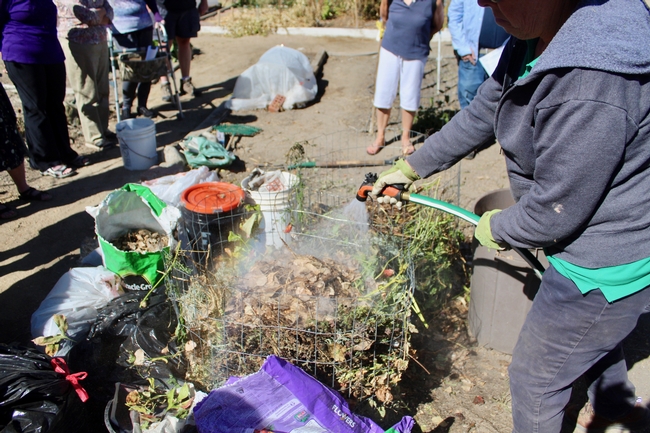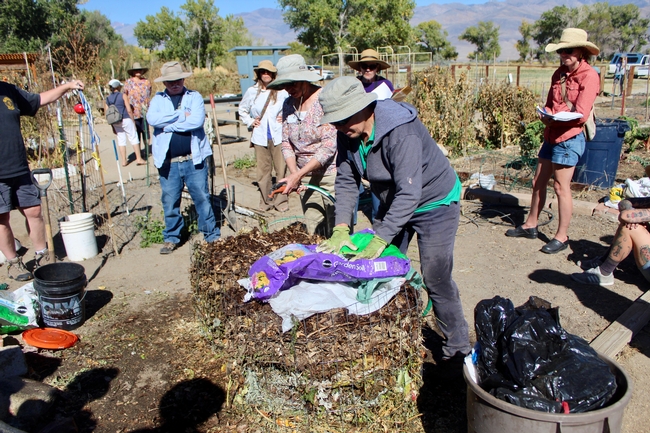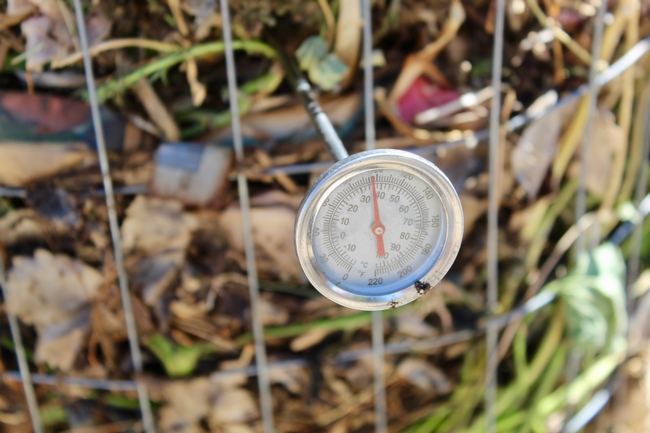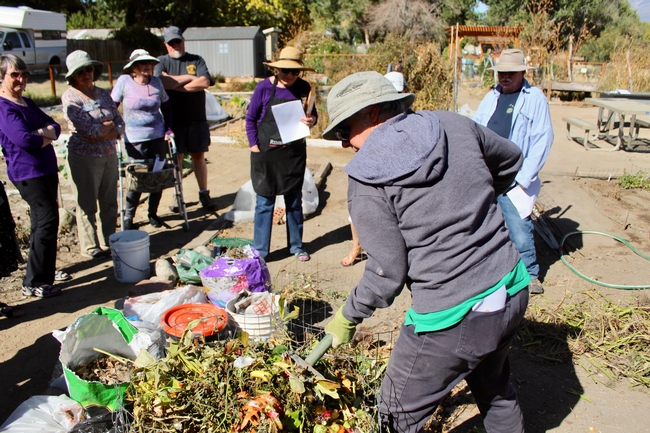- Author: Erich Warkentine
The Farm + Food Lab, located in the City of Irvine's Great Park, features themed raised-bed gardens, fruit trees, vertical gardening, a worm compost bin, and solar and wind-powered lights. It is operated by a partnership consisting of the City of Irvine, Solutions for Urban Ag, and the UCCE Master Gardeners of Orange County.

During a recent visit to Southern California, we visited the Farm + Food Lab. It turned out that officially it was closed due to high winds, but we introduced ourselves to two of the people who were working on site and were privileged to be given a private tour! Everyone had their own tour highlights, but two on which we all agreed were (1) the survivor tree – progeny of a tree from the center of the 9/11 building complex – which is now growing big and strong; and (2) three progeny of the Manzanar Pear Trees.
Some of the themed beds include the Pizza and Spaghetti Garden, Butterfly Garden and chicken coop, and pollinator garden.
The Orange County Master Gardeners present classes to the community on such topics as garden tool care and maintenance and fruit tree pruning and berry planting. Orange County Master Food Preservers have presented classes on food preserving.
For more information, see:

- Author: Erich Warkentine
On October 6, Inyo-Mono Master Gardener volunteer Laura Mogg presented the latest Sunday Seminar on composting. She explained the benefits and practical details of composting, and provided a handout from UC Cooperative Extension providing further details.


Laura provided a demonstration of a simple and easy way everyone can compost garden and kitchen waste. Materials are simple: a bit of fence material that is shaped into a cylinder 3 ft wide and 3 ft tall into which layers of leaves, kitchen scraps, coffee grounds, and animal waste from herbivores are added. An even mix of fresh green waste and brown waste is ideal, and any large or woody plants should be cut into small pieces for best results. The pile within the cylinder is thoroughly watered down and topped with a plastic cover to keep it from drying out in our arid climate.

A compost thermometer is required to monitor the temperature of the pile to see when it is ready to turn (between 140°F and 150°F) and to monitor watering and turning until its ready. The finished compost will be about 1/3 the volume of the original contents of the pile.
Bottom line: it didn't look all that hard, and the benefits to our gardens and landfills are too big to ignore.
- Author: Trina Tobey
Visions of beautiful lush gardens in my yard and delicious homegrown veggies on my table were my primary motivation for applying to be a UC Master Gardener. Yes, my motivation was primarily selfish. The application process was quite intense with an application, essay questions, and an interview. Putting effort into the application process caused me to feel even more elated when I received the letter welcoming me into the training group. I'd been selected despite my lack of experience in gardening!
Arriving at the first day of class, I was taken by the variety of ages, backgrounds, and genders represented in my cohort. I was nervous that I would not be taken seriously because of my lack of experience in gardening, but to the contrary, my classmates and trainers were all welcoming and friendly. Since the class is in Bishop, I knew a couple of my classmates already. Not all of the “Sprouts,” as they called us trainees, were from Bishop though. My class consisted of residents of Mammoth, Hamill Valley, Chalfant, Independence, Lone Pine, and even Fish Lake Valley. One of the benefits of becoming a Master Gardener was learning from my classmates' diverse life experiences.
You might think that the Master Gardener training course teaches you how and what to plant, how to fertilize and water your plants, and how to prevent pests and diseases in the safest way possible like I did; which it does, but it also goes much, much more in depth than these topics. My class was the first to complete our training in a hybrid manner which consisted of online videos, articles, and quizzes as well as in-person, hands-on classes a few times a month. The course covered everything from soil science to plant and insect classifications to algebra and was facilitated by our omniscient professor and Inyo-Mono counties Farm Advisor Dustin Blakey.
At the end of the class, we were asked to pass an exam and present on a poster board of our own creating on a gardening topic of our choice. Fifteen of the twenty-one who were accepted stuck through until the end and all passed. We received our certificates, aprons, and official “Master Gardener” name tags.
I'm sure my selfish reasons for taking the class helped me stick it through until the end. Now, however, it is time to give back…50 volunteer hours in the first 12 months. Since completing the class, I have realized how many questions about gardening I cannot answer without doing some research but it feels powerful to have the resources to answer friends', family members', and community members' gardening questions. And I continue to learn each time I research a question or attend a Master Gardener event.
If you are wondering if you should take the plunge and dive into the Master Gardener world, know this. The training is time consuming but you receive more than adequate support from the professor, your classmates, and the Master Gardener community. You will learn A LOT!!! And you will learn that you have A LOT MORE to learn. Despite whatever selfish reasons you have for joining, you will find that you feel satisfied passing your knowledge along to others and continuing to learn through your volunteer hours. So go ahead, take the plunge, and do it for selfish reasons.







